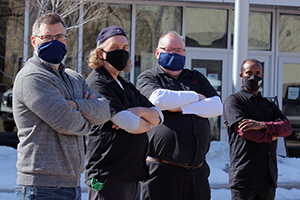
Facilities team on frontline of war on deadly COVID-19 virus
Strict protocols, dedicated staff members have kept STM community safe during pandemic
By Paul SinkewiczGreg Clemence had the loneliest job on campus last year.
When the COVID-19 pandemic shut down St. Thomas More College building in March 2020, he was often the lone occupant of the building for extended periods of time.
As Facilities Manager, it was his responsibility to make sure the building was operating properly and was secure.
If there was a ghost at STM, Clemence would know it by now. (Spoiler alert: There is not!)
Students were forced to finish their winter semester from home, and even staff and faculty were not allowed in the building without special permission.
“It was just me, really, when we shut down completely,” said Clemence. “And the only reason I had to be here was the boilers. We can’t shut them down, so they have to be attended to every day, So, I just checked the building, made it secure, and bounced around my office quite a lot.”
“After we opened up part of the building and people started coming back, it's been good. It's nice to see the building getting used -- at least in part.”
Clemence is charged with implementing the protocols that are keeping the faculty, staff and students at STM College safe when they visit.
The pandemic – which has killed more than 465 people in Saskatchewan -- has challenged the STM facilities team to take its game to the microscopic world.
The experienced crew of Don Wiebe, Tony Wurtz and Anteneh Seyoum used to clean things like muddy footprints in the hallways and fingerprints on doors and windows. Now, it's the unseen things they have to worry about. But they have more than risen to the challenge.
“It's funny, because it's simpler than it was. Their duties are more important than they were before – not that they were not important -- but it's simpler,” said Clemence. “We don’t empty as many garbage bins and we don't clean certain areas in a regular basis. Ninety per cent of what the guys do now is repetitive cleaning of all the public areas and all of the areas that we know people have been.”
It is critically important that the facilities team know where people have been so they can target their sanitizing efforts.
“Everything gets extra attention. The guys have to pay a lot more attention to their detail and I feel for them, because it is probably the least glamorous job they could be doing right now, but their efforts have clearly shown that it's working, and that it's important.”
Students can now use the student lounge, Choices cafeteria, Shannon Library and the atrium, up to a maximum of 50 people. And all visitors must enter through the North Entrance.
“We intentionally limited it that way so that people don't walk through the whole property because that just makes it impossible to clean,” said Clemence.
The faculty and staff have to report if they've been to a certain area so the facilities team can go in behind and sanitizes the area afterward.
Safety is everything when a tiny virus can send someone to the hospital.
“We bought a lot more hand sanitizer stations,” said Clemence. “We basically plastered them everywhere, and we have a ridiculous amount hand sanitizer on hand.”
“We have a few professors that are using designated classrooms to stream their lessons, but the vast majority are doing it from home now. I think we have three regular professors that come in and do their classes here. The rooms have a camera and multi cameras for the white boards and they can do it on there. They book the room and the facilities staff comes in afterward to sanitize again.”
“So far it's all been working out pretty smoothly.”
With summer approaching, there are some renovation projects planned to take advantage of the empty hallways.
The floor in the Chelsea Lounge has been resurfaced and new windows were installed in the older part of the building. Crews replaced the 60-year-old single-pane windows with modern, triple-paned windows, which will help with heating costs.
A large section of roof will be revamped over the summer, and the seating in the Fr. O’Donnell Auditorium will be replaced.
“The seats in there are 20-plus years old and they're tired,” said Clemence. “Nowadays, of course, everybody comes in with a laptop, so we're getting modern, slightly bigger seats with slightly bigger desktops.”
“We've got a few capital projects on the go, and it's really a good time to do it because even in a typical summer there are not many people here. This year there's going to be even less.”
